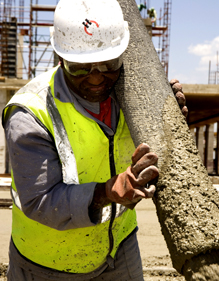
The past week has been a watershed in two related perceptions of corruption in South Africa.
The first is that the private sector bears little responsibility for corruption. The second is that no good news regarding corruption ever comes out of the public sector.
The notion that the private sector was, at most, a minor player in corruption, was always fanciful. In most of the corruption cases related to public procurement, there are private sector companies involved – the private sector firm pays the bribe to the public sector official.
But this week focused on a case of “pure” private sector corruption, namely the competition tribunal hearings of the settlement agreement reached between the competition commission and 15 construction companies found to have engaged in rigging bids for tenders, including tenders for public sector contracts.
Collusion – an agreement between competitors to fix prices, allocate markets or rig bids – is not only anti-competitive, it’s also corrupt.
It’s corrupt because it’s a conspiracy against the public. The public pays both as taxpayer and as consumer of public services, the latter being the poorest South Africans who are most reliant on public services. Rigging bids for public sector tenders also undermines the very system – public tendering – designed to meet the constitutional requirement that public sector procurement be fair, transparent and cost-effective.
After this week, there should be no self-righteous chest-thumping by the private sector about corruption in the public sector. At least it must be clear that both urgently need to confront the corruption problems in their own ranks.
The remarkable progress made by the competition authorities in cracking cartel cases makes them stand out as the public sector law-enforcement agencies that are achieving their intended purpose. We can quibble about whether their remedial and punitive powers are sufficiently strong, but there is no denying they are catching the bad guys.
There are a range of reasons for this, but pre-eminent is the statutory independence of both bodies from political control and interference, bolstered by the fiercely independent leadership of both the commission and the tribunal. Contrast this with the National Prosecuting Authority, whose head is not only deeply compromised by allegations of corruption, but who is only an acting appointment and therefore likely to be looking over her shoulder in order to please those who will decide whether or not her position will be made permanent.
The second bit of good news out of the public sector was the standard set by Minister of Finance Pravin Gordhan in the matter concerning the head of the SA Revenue Service (Sars).
Reacting to media reports of misconduct by the then head of Sars, Oupa Magashula, Gordhan immediately convened an independent inquiry.
The inquiry, whose report was made public, confirmed that the conduct of Magashula, though not criminal, did not match the level of integrity required of a senior public servant and was therefore bringing his high office and the standing of Sars into disrepute. So Magashula resigned.
No procrastination, no secret reports, no golden handshakes, no unfinished business.
If the handling of Nkandlagate represents all that has eroded confidence in the public sector, then the Sars matter shows that when it comes to dealing with corruption there are indeed centres of excellence and great political will in important pockets of the public sector.
And so, in the past week, the public sector took a few small steps towards confronting its reputation for tolerating corruption and disreputable conduct. In the same week, the ugly face of the private sector was revealed for all to see.
It’s vital that each regain the trust of the public. Rebuilding this trust is where we have to set our sights.
– David Lewis is executive director of Corruption Watch and chaired the competition tribunal for a decade from its founding in 1999
– This article was first published in City Press

